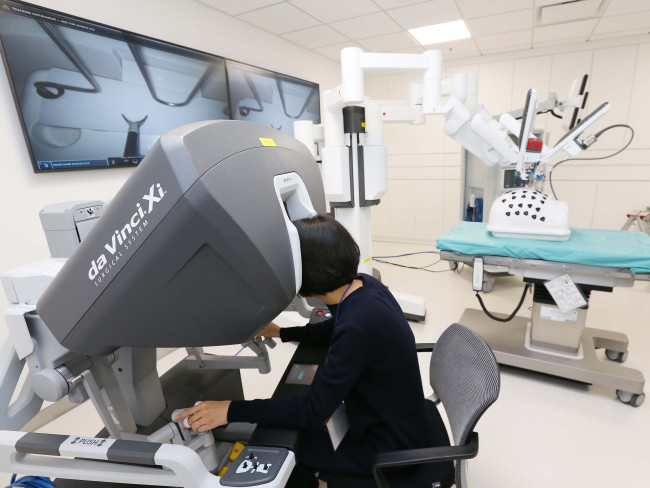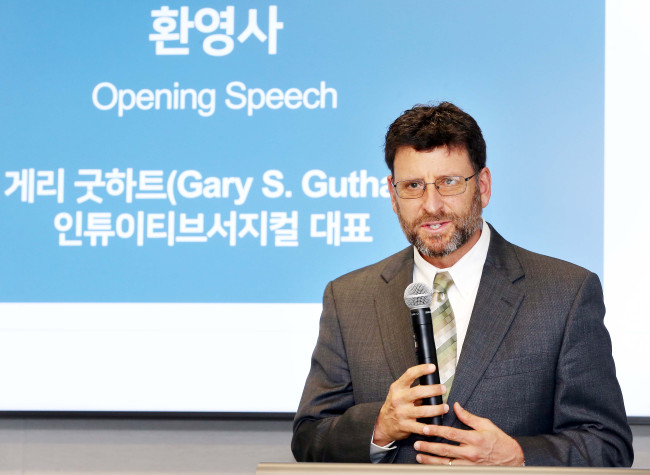Intuitive Surgical opens new da Vinci surgical robot training center in Korea
CEO Guthart says Korean surgeons’ culture of innovation was behind decision to open Korean center
By Sohn Ji-youngPublished : Nov. 8, 2017 - 13:20
Intuitive Surgical, the world’s top surgical robot maker best known for its da Vinci surgical robot system, opened a new surgical innovation and training center in South Korea on Tuesday.
Located inside the Sangam DMC High-Tech Industry Center in northeastern Seoul, the 3,624-square-meter facility features five training stations equipped with seven da Vinci systems and lecture rooms with audiovisual equipment for hosting live video meetings
It also provides two open demo rooms where anyone, including nonsurgeons, can learn how da Vinci works and get hands-on experience running the device.
The Seoul center is the fourth of its kind to be established by Intuitive Surgical, which currently operates two similar facilities in the US and one in Japan.
Located inside the Sangam DMC High-Tech Industry Center in northeastern Seoul, the 3,624-square-meter facility features five training stations equipped with seven da Vinci systems and lecture rooms with audiovisual equipment for hosting live video meetings
It also provides two open demo rooms where anyone, including nonsurgeons, can learn how da Vinci works and get hands-on experience running the device.
The Seoul center is the fourth of its kind to be established by Intuitive Surgical, which currently operates two similar facilities in the US and one in Japan.

Based in Sunnyvale, California, Intuitive Surgical introduced the world’s first surgical robot system in the US in 2000, paving new frontiers in the field of minimally invasive endoscopic surgery. Led by sales of its da Vinci system, the firm posted a global revenue of around $2.7 billion in 2016.
In the operating room, the device’s four robotic arms are positioned directly over the patient. The arms are controlled by a computer that replicates the movements of a surgeon sitting at a separate console, which provides a 3-D view of the surgical site.
Robot-assisted surgeries offer better visualization, dexterity, precision and stability for surgeons, enabling them to carry out operations with incisions that are only 1 to 2 centimeters long.
The US surgical robot maker entered Korea in 2005, when Yonsei University’s Severance Hospital performed its first robot-assisted surgery using the da Vinci system. Since then, Korea has emerged as a leader in the practice, with local surgeons inventing and perfecting new ways of applying robots to a wider range of surgical procedures.
Korea is not Intuitive Surgical’s biggest market. There are just 69 da Vinci systems deployed in 51 hospitals in Korea, compared to the worldwide total of 4,271 systems as of September 2017.
Nonetheless, the firm decided to invest $8.82 million toward opening the new surgical innovation and training center in Korea because of its innovation in robot-assisted surgeries.

“Why are we investing in Korea? The reason is Korean surgeons share our culture of innovation,” Intuitive Surgical CEO and President Gary S. Guthart said during a press conference Tuesday at the Seoul-based center.
According to Guthart, Korean surgeons were the first in the world to apply robotic procedures for colon and rectal surgeries, while also taking global leadership in head and neck surgeries.
“We find here something you do well -- a drive and interest by Korean surgeons to create better options for not only patients in Korea, but also patients around the world,” he said.
The company expects its surgical robot training centers to create synergy with one another by being a platform for skilled surgeons worldwide to share their surgical insights and practices.
“Training centers afford us the opportunity to human performance research. They provide more than skill acquisition. They can improve the general knowledge of the surgeon population about what works and doesn’t work,” Guthart said.
The opening of the Seoul-based center comes after the release of the company’s latest product, the da Vinci X, which obtained regulatory approval from Korea’s Ministry of Food and Drug Safety last month.
The da Vinci X is designed to be available at a slightly lower price than its flagship model da Vinci Xi, while still providing users with most of the abilities of the flagship device.
The biggest difference is the X model offers less versatility than the Xi model because the robotic arms are limited in the range of movements they can perform. But it is a trade-off for the lower price.
Korean medical tech firm Meere Co. is preparing to break Intuitive Surgical’s market monopoly with a similar surgical robot of its own, the Revo-i, which was approved by Korean regulators in August.
When asked about its view of competitors like Meere Co., the US-based company said that it “welcomes newcomers to the surgical robot market.”
“We have long been a lone player in this field. That many firms are developing surgical robots is proof that robots are very good at carrying out endoscopic surgeries,” said Intuitive Surgical’s Vice President of Sales and Marketing Sohn Seung-wan.
By Sohn Ji-young (jys@heraldcorp.com)




![[Herald Interview] 'Amid aging population, Korea to invite more young professionals from overseas'](http://res.heraldm.com/phpwas/restmb_idxmake.php?idx=644&simg=/content/image/2024/04/24/20240424050844_0.jpg&u=20240424200058)












![[KH Explains] Korean shipbuilding stocks rally: Real growth or bubble?](http://res.heraldm.com/phpwas/restmb_idxmake.php?idx=652&simg=/content/image/2024/04/25/20240425050656_0.jpg&u=)

